Bryan Bryson will join the Department of Biological Engineering as an assistant professor in the summer of 2018. Bryson earned a BS in mechanical engineering, with minor in biomedical engineering, and a PhD in biological engineering from MIT; his doctoral thesis was on proteomics and systems biology. He is currently completing postdoctoral work at the Harvard School of Public Health and the Ragon Institute, developing single-cell transcriptomic and proteomic methods for analysis of microbe-host interactions in the pathogenesis of tuberculosis. Bryson’s research program will center on systems biology approaches to infectious disease, primarily tuberculosis, and his teaching will include 20.440 (Analysis of Biological Networks), a graduate core subject on the analysis of biological networks, and 20.309 (Instrumentation and Measurement for Biological Systems), an undergraduate core laboratory subject on instrumentation and measurement for biological systems. Bryson served as a student representative on MIT’s last presidential search committee and was the recipient of numerous student awards at MIT, including the Hugh Hampton Young Fellowship for the combination of academic achievement with exceptional personal character.
https://engineering.mit.edu/wp-content/uploads/Bryan_Bryson-330x330.gif
Website
Bryan Bryson
Biological Engineering https://be.mit.edu/directory/bryan-brysonManya Ghobadi joined the Department of Electrical Engineering and Computer Science as an assistant professor in October. Previously, she was a researcher at the Microsoft Research Mobility and Networking group. Prior to Microsoft, she was a software engineer at Google. Ghobadi received her PhD in computer science at the University of Toronto and her BEng in computer engineering at the Sharif University of Technology. A computer systems researcher with a networking focus, she has worked on a broad set of topics, including data-center networking, optical networks, transport protocols, network measurement, and hardware-software co-design. Many of the technologies she has helped develop are part of real-world systems at Microsoft and Google. She was recognized as an N2women Rising Star in networking and communications in 2017. Her work has won the best dataset award, Google research excellent-paper award (twice), and the ACM Internet Measurement Conference best-paper award.
https://engineering.mit.edu/wp-content/uploads/manya_ghobadi-scaled-330x330.jpg
Website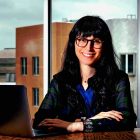
Manya Ghobadi
Electrical Engineering and Computer Science http://www.eecs.mit.edu/people/faculty/manya-ghobadiRafael Gomez-Bombarelli will join the faculty in the Department of Materials Science and Engineering as an assistant professor in January 2018. He received a BS, MS, and PhD in chemistry from the University of Salamanca in Spain, followed by postdoctoral work at Heriot-Watt University and Harvard University. He is currently a senior researcher at Kyulux NA, applying Harvard-licensed technology to create commercial organic light-emitting diode products. Gomez-Bombarelli’s research has evolved from experimental mechanistic studies of organic molecules with an emphasis on environmental toxicity, to computer-driven design of molecular materials. By combining first-principles simulation with machine learning on theoretical and experimental datasets he aims to accelerate the discovery of novel practical materials. At MIT he plans to address the role of molecular transformation in materials discovery in areas such as catalyst design, the environmentally-minded development of novel and replacement chemicals, and designing for stability in advanced materials. Honors presented to Gomez-Bombarelli include the Spanish accreditation for Profesor Ayudante Doctor, and the University of Salamanca’s doctoral thesis award. His work has been featured in MIT Technology Review and The Wall Street Journal. He was also co-founder of Calculario, a materials discovery company that leverages quantum chemistry and machine learning to target advanced materials in a range of high-value markets.
https://engineering.mit.edu/wp-content/uploads/Rafael_Gomez-Bombarelli_6-2-330x330.jpg
Website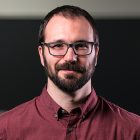
Rafael Gomez-Bombarelli
Materials Science and Engineering https://engineering.mit.edu/faculty/rafael-gomez-bombarelli/Carmen Guerra-Garcia will join the Department of Aeronautics and Astronautics as an assistant professor in the fall of 2017. Graduating from the Universidad Politecnica de Madrid with an aeronautical engineering degree in 2007, Guerra-Garcia then matriculated in the Space Propulsion Laboratory at MIT. She completed her PhD with a concentration in plasma physics and propulsion and a minor in numerical methods in 2014. Following a one-year postdoctoral position with Professor Paulo Lozano, Guerra-Garcia relocated to Boeing Madrid for a year. Her research will focus on the study of plasmas for aerospace applications, including plasma-assisted combustion, space propulsion, and lightning strikes on aircraft.
https://engineering.mit.edu/wp-content/uploads/Carmen_Guerra_Garcia_15-scaled-330x330.jpg
Website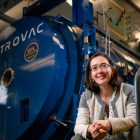
Carmen Guerra-Garcia
Aeronautics and Astronautics #Song Han will join the Department of Electrical Engineering and Computer Science as an assistant professor in July 2018. He received his master’s degree and PhD in electrical engineering from Stanford. His research focuses on energy-efficient deep learning at the intersection of machine learning and computer architecture. Han proposed the deep compression algorithm, which can compress neural networks by 17 to 49 times while fully preserving prediction accuracy. He also designed the first hardware accelerator that can perform inference directly on a compressed sparse model, which results in significant speed increases and energy saving. His work has been featured by O’Reilly, TechEmergence, and The Next Platform, among others. Han has won best-paper awards at the International Conference on Learning Representations and the International Symposium on Field-Programmable Gate Arrays.
https://engineering.mit.edu/wp-content/uploads/Song_Han_15-330x330.gif
Website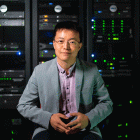
Song Han
Electrical Engineering and Computer Science https://engineering.mit.edu/faculty/song-han/Phillip Isola will join the Department of Electrical Engineering and Computer Science as an assistant professor in July 2018. He received a bachelor’s degree in computer science from Yale University and a PhD in brain and cognitive sciences from MIT. Currently a fellow at OpenAI, Isola studies visual intelligence from the perspective of both minds and machines. He received a National Science Foundation (NSF) graduate fellowship as well as an NSF postdoctoral fellowship.
https://engineering.mit.edu/wp-content/uploads/Phillip_Isola_8-scaled-330x330.jpg
Website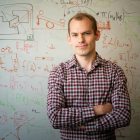
Phillip Isola
Electrical Engineering and Computer Science https://engineering.mit.edu/faculty/phillip-isola/Tim Kraska will join the Department of Electrical Engineering and Computer Science as an associate professor in January 2018. Currently an assistant professor of computer science at Brown University, Kraska received a PhD from ETH Zurich, then spent three years as a postdoc in the AMPLab at the University of California at Berkeley, where he worked on hybrid human-machine database systems and cloud-scale data management systems. He focuses on building systems for interactive data exploration, machine learning, and transactional systems for modern hardware, especially the next generation of networks. Kraska was recently selected as a 2017 Alfred P. Sloan Research Fellow in computer science. He has also received an NSF CAREER Award, an Air Force young investigator award, two Very Large Data Bases conference best-demo awards, and a best-paper award from the IEEE International Conference on Data Engineering.
https://engineering.mit.edu/wp-content/uploads/Tim_Kraska_11-330x330.jpg
Website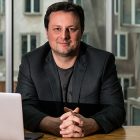
Tim Kraska
Electrical Engineering and Computer Science https://engineering.mit.edu/faculty/tim-kraska/Mingda Li will join the Department of Nuclear Science and Engineering as an assistant professor in January 2018. He completed his BS in engineering physics at Tsinghua University in 2009 and his PhD in nuclear science and engineering at MIT in 2015. After that, he carried out research as a postdoc at MIT’s Department of Mechanical Engineering. His Energy Nano Group aims to utilize defects to improve material performance through defect engineering, including experimental and theoretical studies on functional extended defects, controllable defective single crystal growth, AI-aided spectroscopy for defect resolution, and nanoscale energy transport and conversion processes with the presence of defects.
https://engineering.mit.edu/wp-content/uploads/Mingda_Li_9.gif
Website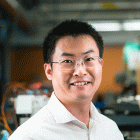
Mingda Li
Nuclear Science and Engineering https://engineering.mit.edu/faculty/mingda-li/Tami Lieberman will join MIT as an assistant professor with dual appointments in the Department of Civil and Environmental Engineering and the Institute for Medical Engineering and Science in January 2018. Lieberman earned a BA in molecular biology and genetics at Northwestern University, where she was awarded a Barry M. Goldwater Scholarship. She earned a PhD in systems biology from Harvard, where she developed new genomic approaches for understanding how bacteria evolve during infections of individual people. Lieberman is currently a postdoc in Eric J. Alm’s lab at MIT, where she has further developed and applied genomic approaches to understand the microbes that colonize the human body. She will lead a computational and experimental research group focused on uncovering the principles governing colonization, niche range, and personalization in the human microbiome. Lieberman has also made contributions to our understanding of antibiotic resistance, including the co-invention of a new platform for visualizing evolution in real time.
https://engineering.mit.edu/wp-content/uploads/Tami_Lieberman_32-330x330.jpg
Website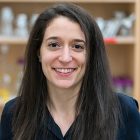
Tami Lieberman
Civil and Environmental Engineering Institute for Medical Engineering and Science https://engineering.mit.edu/faculty/tami-lieberman/Richard Linares joined the Department of Aeronautics and Astronautics as an assistant professor last July. Before joining MIT, he was an assistant professor at the University of Minnesota’s aerospace engineering and mechanics department. Linares received his BS, MS, and PhD degrees in aerospace engineering from the State University of New York at Buffalo. He was a Director’s Postdoctoral Fellow at Los Alamos National Laboratory and also held a postdoc appointment at the United States Naval Observatory. His research areas are astrodynamics, estimation and controls, satellite guidance and navigation, space situational awareness, and space-traffic management.
https://engineering.mit.edu/wp-content/uploads/blank-profile-picture-330x330.png
Website
Richard Linares
Aeronautics and Astronautics https://aeroastro.mit.edu/richard-linaresFarnaz Niroui will join the Department of Electrical Engineering and Computer Science (EECS) as an assistant professor in January 2019. She received her PhD and master’s degrees in electrical engineering from MIT and a bachelor’s degree in nanotechnology engineering from the University of Waterloo. She is currently a Miller Postdoctoral Fellow at the University of California at Berkeley. Her research integrates electrical engineering with materials science and chemistry to develop hybrid nanofabrication techniques to enable precise yet scalable processing of nanoscale architectures capable of uniquely controlling light-matter interactions, electronic transport, and exciton dynamics to engineer new paradigms of active nanoscale devices. During her graduate studies, Niroui was a recipient of the Engineering Research Council of Canada scholarship, and she was selected for the Rising Stars program in EECS at MIT in 2015 and in 2016 at Carnegie Mellon University.
https://engineering.mit.edu/wp-content/uploads/blank-profile-picture-330x330.png
Website
Farnaz Niroui
Electrical Engineering and Computer Science https://engineering.mit.edu/faculty/farnaz-niroui/Kevin O’Brien joined the Department of Electrical Engineering and Computer Science as an assistant professor last July. He earned a BS in physics from Purdue University and a PhD in physics from the University of California at Berkeley. He joined the Quantum Nanoelectrics Lab (Siddiqi Group) at UC Berkeley as a postdoc to lead development of multiqubit quantum processors. His work has appeared in top journals including Science, Nature Materials, and Nature Communications, among others. He has been an NSF Graduate Fellow. His research bridges nonlinear optics, metamaterials, and quantum engineering.
https://engineering.mit.edu/wp-content/uploads/blank-profile-picture-330x330.png
Website
Kevin O’Brien
Electrical Engineering and Computer Science https://www.eecs.mit.edu/people/faculty/kevin-obrienDesiree Plata will join the Department of Civil and Environmental Engineering as an assistant professor in July 2018. She earned her bachelor’s degree in chemistry from Union College in Schenectady, New York, in 2003, and her PhD in chemical oceanography and environmental chemistry from the MIT-Woods Hole Oceanographic Institution’s joint program in oceanography in 2009. Plata is currently the John J. Lee Assistant Professor of Chemical and Environmental Engineering at Yale and associate director for research at the Center for Green Chemistry and Green Engineering at Yale. Previously, she was in the civil and environmental engineering department at Duke, where she was active in several international research networks, such as the EPA-funded LCNano (studying the environmental implications of nanomaterials across the life cycle) and the NSF-funded Partnership for International Research and Education, studying water and commerce as related to the energy sector. Plata’s work is in the area of environmental chemistry, with applications in minimizing the environmental impact of emerging industries — with a particular focus on nanotechnologies across the energy sector. She has made fundamental contributions to the field of heterogeneous catalysis with respect to the bond-building mechanisms in carbon nanotube synthesis, which can be leveraged to lessen environmental impacts. Her work continues to illuminate novel chemistries that occur during environmental transformation processes of organic molecules. Plata is an NSF CAREER awardee, a National Academy of Engineers Frontiers of Engineering fellow, and a two-time National Academy of Sciences Kavli Frontiers of Science fellow, and was recently recognized for excellence by Caltech’s Resnick Sustainability Institute.
https://engineering.mit.edu/wp-content/uploads/Desiree_Plata_28-330x330.gif
Website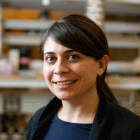
Desiree Plata
Civil and Environmental Engineering https://engineering.mit.edu/faculty/desiree-plata/Frances M. Ross joined the Department of Materials Science and Engineering as a full professor in December. Previously she was a member of the nanoscale materials analysis department at IBM’s Thomas J. Watson Research Center, where she performed research on nanostructures using transmission electron microscopes (TEM) that allow researchers to see, in real time, how nanostructures form, and then to see how the growth process is affected by changes in temperature, environment, and other variables. Understanding materials at such a basic level has remarkable implications for many applications including semiconductors, energy storage, and more. Ross earned her BA and PhD at Cambridge University and was a postdoc at AT&T Bell Labs. She has been recognized with many awards and honors, including election to fellow in the American Physical Society, the Materials Research Society, the American Association for the Advancement of Science, the Microscopy Society of America, the American Vacuum Society, and the Royal Microscopical Society. She holds the Ellen Swallow Richards Chair.
https://engineering.mit.edu/wp-content/uploads/Frances_Ross_6-330x330.gif
Website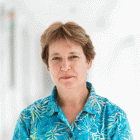
Frances M. Ross
Materials Science and Engineering https://dmse.mit.edu/faculty/profile/frossArvind Satyanarayan will join the Department of Electrical Engineering and Computer Science as an assistant professor in July 2018. He received a bachelor’s degree from the University of California at San Diego and a master’s degree from Stanford — both in computer science — and a PhD in computer science from Stanford, working with the University of Washington Interactive Data Lab. Satyanarayan is currently a postdoc at Google Brain, working on improving the interpretability of deep-learning models through visualization. He focuses on developing new declarative languages for interactive visualization and leveraging them in new systems for visualization design and data analysis. His work has also been deployed on Wikipedia to enable interactive visualizations within articles. Satyanarayan’s research has been recognized with a Google PhD fellowship and best-paper awards at the IEEE InfoVis and the Association for Computing Machinery (ACM) Computer-Human Interaction conference.
https://engineering.mit.edu/wp-content/uploads/Arvind_Satyanarayan_31-330x330.gif
Website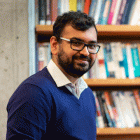
Arvind Satyanarayan
Electrical Engineering and Computer Science https://engineering.mit.edu/faculty/arvind-satyanarayan/Suvrit Sra joins the Department of Electrical Engineering and Computer Science and the Institute for Data, Systems and Society as an assistant professor this month. He was a principal research scientist in the Laboratory for Information and Decision Systems (LIDS) at MIT. He obtained his PhD in computer science from the University of Texas at Austin in 2007. Before joining LIDS, he was a senior research scientist at the Max Planck Institute for Intelligent Systems in Tübingen, Germany. He has also held visiting faculty positions at UC Berkeley and Carnegie Mellon during 2013–14. His research bridges areas such as optimization, matrix theory, geometry, and probability with machine learning. More broadly, he is interested in data-driven questions within engineering, science, and health care. His work has won several awards at machine learning venues, as well as the 2011 SIAM Outstanding Paper Award. He founded the OPT Optimization for Machine Learning series of workshops at the Neural Information Processing Systems conference, which he has co-chaired since 2008; he has also edited a popular book with the same title (MIT Press, 2011).
https://engineering.mit.edu/wp-content/uploads/blank-profile-picture-330x330.png
Website